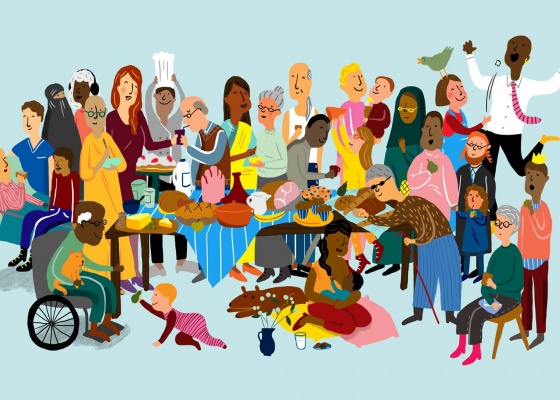Eating anything is always better than nothing.
When we have a small appetite or have difficulty chewing or swallowing, there are a number of things we can do for ourselves that may encourage us to eat better.
Top tips for eating well:
-
Eat more protein
Protein is an essential nutrient, and we need to get it from food every day because our bodies don’t store it as they do fats and carbohydrates. Having protein with every meal will help us keep well-nourished.
-
Eat food that you enjoy
-
Try eating small meals and snacks six times a day rather than three bigger meals.
-
Eat small portions – little and often.
-
Move to full-fat foods like milk, yoghurt and cheese.
-
Have milky drinks with full-fat milk and a biscuit between meals.
-
If you have difficulty chewing, try eating soft foods such as scrambled eggs or yoghurts.
-
If your teeth or dentures are a problem, make an appointment with your dentist. Some dentists will also make home visits. Read more about teeth and mouth care.
-
If you’re having trouble cooking or cutting up food, speak to your GP or local council. They may be able to arrange an occupational therapy assessment. They can give lots of practical ideas and tools to help. For more information, visit here.
-
If you have trouble shopping or cooking food, a local community organisation may be able to help. Supermarkets offer online shopping and home delivery services, which may make shopping easier for you.
-
Make use of home delivery services such as Wiltshire Farm Foods. They also have foods that are soft, fork mashable and textured for all eating difficulties.
- If you’re finding it difficult to chop or prepare fruit and vegetables, you can buy pre-chopped packets in supermarkets.
Eating alone sometimes is not helpful to improve our appetite
-
Ask a friend or relative out to a café.
-
Ask a friend round for a snack.
-
Ask a community organisation for information about lunch clubs or other social clubs. You can find your local Age UK and information about what services they offer on the Age UK website or call the Age UK advice line on 0800 678 1602.
- When you are alone, eat with a favourite TV or radio programme, or read a book – it might just help in the short term.
Vegetarian and vegan or plant-based diets
Increasing numbers of us are now choosing to eat less meat or follow vegetarian or vegan diets.
If you are vegetarian or vegan, it’s important to keep an eye on your weight and make sure you are eating a balanced diet to get the right nutrients to stay well. All care homes should provide nutritious food suitable for vegetarian and vegan diets.
Make sure you are eating a wide variety of plant-based products – including vegetables, whole grains, nuts, seeds and fruits. There are also lots of vegan alternatives to common dairy and meat products, like vegan cheese, soy mince, soy or oat milk that are now widely available in supermarkets.
The Vegetarian Society and Vegan Society have more information and advice on eating a healthy and nutritious diet.
Vegetarian for Later Life is a charity that provides diet and healthy living advice for older vegetarians and vegans and caterers. Their website includes recipes and menu planners.
Ethnic minority foods
The Older People Services Development Project in Scotland has produced a booklet to help people from minority ethnic backgrounds with their diet as they grow older. You can download it here.
Remember...
If you’re worried about weight loss, have a small appetite, or finding it difficult to chew or swallow food, talk to your GP or Practice Nurse. Perhaps ask a friend, relative or carer to go with you.
If you notice any of the following when eating or drinking, make an appointment to see your GP or the Practice Nurse:
- Difficulty swallowing.
- Choking or coughing and spluttering.
- Bringing food back up, sometimes through your nose.
- A sensation that food is stuck in your throat or chest.
- A change in the sound of your voice soon after eating.
There are more tips and ideas in our booklet, ‘Eating well in later life,’ which can be downloaded from our resources page or you can request a hard copy by contacting us.
We’ve put together some more ideas to help on the following pages:
When you just can’t be bothered

